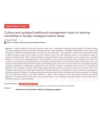A major proportion of coral reefs around the world occur in small island developing countries (SIDS). The status of these resources is declining, while these countries simultaneously face major challenges in sustainable development for their people. Reef conservation in SIDS cannot be approached in the same way as conservation in more developed countries, even though the tools such as Marine Protected Areas may be effective for both situations. One of the main differences relies on the widespread inability of government services within SIDS to ensure adherence to legal frameworks aimed at protecting the reef resources from irreversible depletion. This gap can be compensated with a strong ownership by local communities through locally managed marine areas. The emergence of a real ownership strongly depends on the ability of developing actors in promoting the cultural dimension as a root of the process of locally based management which should include traditional tools, even if they need, most of the time, to be updated regarding ecological constraints for a sustainable development of reef resources. Therefore, a particular focus should be put by developing agencies on the integration of human factors (anthropology, socio-economics) for insuring the success of the ground actions, with innovative tools such as human factor based Geographic Information Systems. Local ownership can also be boosted by real examples of grounds successes to be shown to candidate communities and another issue relies on the setting up of functional networks at a regional level. The Coral Reef Initiative for the Pacific (CRISP) is a US$ 10 million programme over 3 years which implements this specific approach. The concepts behind CRISP draw on the recommendations of the International Coral Reef Initiative, and specifically seek to find Pacific solutions to regional problems
Liste




 English
English